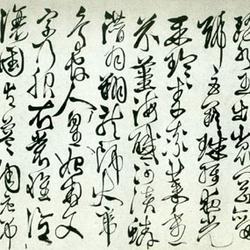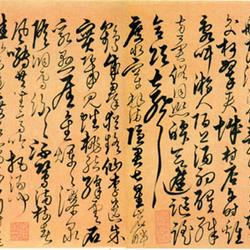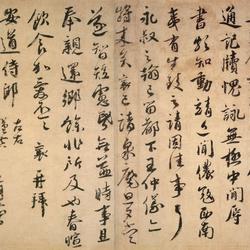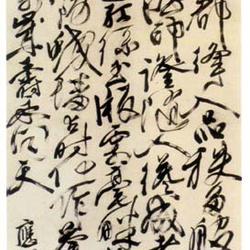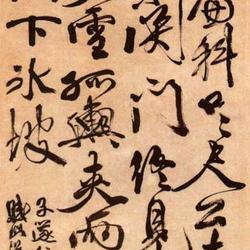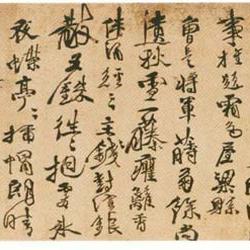
Xu Wei of Ming Dynasty and "Xingcao Yingzhi Sword Scroll"
(Text/Yang Wentao, scanned from Zhejiang People’s Fine Arts Publishing House’s Essence of Chinese Dharma Calligraphy Series)
The lingering fragrance of the ink pond is overwhelming, sweeping long notes, wild flowers splashing into the water, breaking the clouds and mountains. The clouds are gone, the flowers are empty, and the Milky Way casts shadows. A little more, there is a ghost well in Ji Zhang. It's easy to play without daring to hide the picture. Push through the haze and go straight to the top of Songhua. It is similar to the throne of the emperor.
I haven't worn my shirt collar for half my life. I hate the autumn wind, peeling off the green fur, leaving me bald and bare. There are only articles, calligraphy and painting brushes, and they can never succeed alone. There is no recovery, one's own way. He pulled out a golden knife and cut his eyebrows and eyes, smashed his head, and the blood burst into moss and the flowers were cold. Nor is it a human disease.
——"Congratulations to the Bridegroom·A Volume of Cursive Script by Xu Qingteng" ("The Complete Works of Zheng Banqiao")
Xu Wei was born in poverty. Although he had great talents, he failed to succeed in many trials. Although he repeatedly offered strange schemes under Hu Zongxian and was well received, he eventually became mad because of Hu's downfall and committed suicide. He even committed suicide, killed his wife, and was imprisoned. In his later years, the poem "Pictures of Grapes in Ink" goes: "Having been a man of poverty for half his life, his independent study whistles in the evening breeze. There is nowhere to sell the pearls under his pen, and he throws them idlely into the wild vines." It can be described as a portrayal of his desolate later life.
The misfortune of life is certainly painful and tragic, but it is precisely this that created Xu Wei's outstanding performance and outstanding achievements in art. Art serves as a carrier for Xu Wei's emotional catharsis and sublimation. His unruly character, wild talent and unscrupulous life path gave Xu Wei the greatest freedom, so his poems, essays, calligraphy and paintings are all unique. Luck means expressing one's feelings directly, pursuing spirituality and showing true feelings.
Xu Wei claimed: "I am number one in calligraphy, second in poetry, third in essays, and fourth in painting." (Tao Wangling's "The Long Biography of Xu Wen") shows his self-respect and love for his calligraphy. Yuan Hongdao said: "(Xu) regardless of calligraphy, but also the god of calligraphy, he is a Sansage of the Eight Dharma, and a knight of the word forest." It is true that Xu Wei, as a talented person and a madman at one time, will never be bound by the law. , even if it is the starting point of learning calligraphy - copying the calligraphy of the ancients, Xu Wei still has to be self-reliant and unwilling to kneel to the ancients. His "Lanting Copy Collection of Shu Ji Ziwei" says: "It is not a special word, but a copy of worldly affairs is directly to express interest. I compare it with each other, and combine it with talent. I don't want to be true to my appearance?" He also advocated that "it is just based on his spirit and spirit." ". Xu Wei studied calligraphy and was immersed in Huang Tingjian, Mi Fu, and Su Shi of the Song Dynasty, and also followed Zhong Yao, Suo Jing, and the "two kings". Judging from the circulating Xu Wei's calligraphy, is there any stroke that is like the ancients? And play with it. Is there any stroke of the brush that is not from the ancients? This is why Xu Weishan took the "spirit of calligraphy" from the ancients without losing his own character, so he is heroic and interesting and "exquisite and heroic" (Tao Wangling's "Xie'an Collection").
When Xu Wei discusses books, he also talks about "Tiancheng", that is, people's inner qualities. Chang Yun said, "It is still possible for a man to become something by nature without learning. Secondly, he starts with learning and finally becomes something by nature." And "what is made by nature does not come from heaven." Grass" Volume 2). Xu Wei was a talented scholar, omnipotent in the three teachings and nine streams, and his writings are rich and miscellaneous, including ten volumes of "Xu Wenchang's Lost Drafts", thirty volumes of "Xu Wenchang's Complete Works", twenty-five volumes of "Xu Wenchang's Three Collections", and twenty-four volumes of "Xu Wenchang's Lost Manuscripts", etc. Poetry and writing. In terms of opera, there are one volume each of "Four Tones of the Monkey", "Song Dai Xiao", "Nan Ci Narrative", "Original Compilation of Nan Jiugong Yue Lu" and "Thirteen Withered Nan Opera Syllable Score", "Mocking Prostitutes", "Huang Ying" Son" and other Sanqu; the annotation and review categories include "Li Changji's Poetry Annotation", "Zhuangzi Nei Chapter Annotation", "Funshi Ancient Annotation Shen Tongqi", "Huangdi Suwen Annotation", "Surangama Sutra Interpretation", "Huaihai Collection" " forty volumes, etc.; those who compiled miscellaneous records include "Bixuan Essentials", "Xuancha Lei Excerpts", "Tongsongyunjian", "Tea Classic", "Wine History" and so on. His paintings, with their unbridled brushwork and majestic momentum, are known as "Ivy White Sun" together with Chen Daofu's, opening up a new way of freehand ink painting since the Ming and Qing Dynasties. The integration of such diverse and profound talents and knowledge into his calligraphy is the result of "natural creation".
Xu Wei's "Scroll of Chanting Swords Made in Cursive Cursive", on paper, 352 cm high, 102.6 cm wide, eight feet long, magnificent, written in running script with cursive style, dots and paintings, galloping, the shape is like a scroll, and the paper is full of clouds and smoke. It is a breathtaking masterpiece of calligraphy in his later years.
This scroll is now in the Suzhou Museum. At the same time, there is also the "Scroll of Cursive and Ink Chanting" that is paired with this scroll. It is a pair of giant scrolls and is a magnificent sight. According to records, Xu Weidang also had scrolls such as "Ode to Paper", "Ode to Pen", and "Ode to Inkstone", all of which were sent to the poem "Recalling the Flute on the Phoenix Stage". Unfortunately, they are now lost.
The poem "Ode to the Sword" says: "Ou Zhi's good workmanship and Feng Hu's skillful hands cast the fighting light. Hanging it to the head of the bed, the scales of the dragon are cold. There is cold snow on the pillow and flying frost in the box. The hero's liver and intestines are at this moment. I asked Lord Yuan where his home mountain is, by the Yue River. I heard that Hu Chen was a few years old when the autumn was high and the moon was dark, and he invaded the frontier. Recently he was declared a vassal, and for a while he took off his armor and reins. Even if an inch of iron can be eliminated, what's the point? Lao, three feet to lift the general. The ancients said that you must be careful when you are in a safe place, but remember, there is no harm in using the soldiers in their spare time." He is also a great and outstanding hero, with considerable talent and knowledge.

